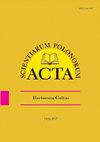杏花开放授粉基因型的形态学评价及gt双图分析
IF 0.7
4区 农林科学
Q4 HORTICULTURE
引用次数: 1
摘要
杏是一种重要的核果品种,栽培品种繁多。因此,培育具有不同果实品质和感官性状的新品种是必要的。本研究利用UPOV描述子和gt双标图分析,对2019-2020年两个生长季节(2019-2020年)从伊朗和意大利几个开放授粉品种和沙鲁迪品种(对照)中选育的37个杏基因型的形态和果实品质属性进行了评价。结果表明,不同基因型杏果实大小存在较大差异。大多数基因型果实为中等大小,8个基因型果实为大果实,4个基因型果实为小果实。产量最高的品种为G-464、G-432、G-588、Shahroudi和G-571。基因型G-432、G-464、G-571、G-573和G-576的单果重高于沙乌地。此外,G-450和G-553的TSS(18.2°Brix)和TSS/TA(25.4)最高。gt -双图分析表明,果实重、尺寸、pH值和TSS值可以作为选择优良基因型的指标。根据目前的研究结果,G-464、G-571和G-450可以作为优良基因型引种,三者杂交有可能培育出果实甜、产量高、果实大的品种。本文章由计算机程序翻译,如有差异,请以英文原文为准。
Pomological evaluation and GT-biplot analysis of promising open-pollinated genotypes of apricot (Prunus armeniaca L.)
Apricot is an important stone fruit species with different cultivars cultivated worldwide. Therefore, breeding programs are necessary for developing new varieties with various fruit quality and sensory traits. The present study evaluated morphological and fruit-quality attributes of thirty-seven apricot genotypes selected from several Iranian and Italian open-pollinated cultivars together with Shahroudi cultivar (control) during two growing seasons (2019–2020) using the UPOV descriptor and GT-biplot analysis. The results showed great variability in fruit size among all apricot genotypes studied. Most genotypes showed medium-sized fruits while large and small fruits were observed in eight and four genotypes, respectively. The highest yield was recorded in G-464, G-432, G-588, Shahroudi and G-571. Genotypes G-432, G-464, G-571, G-573, and G-576 had higher fruit weight than Shahroudi. In addition, G-450 and G-553 had the highest TSS (18.2°Brix) and TSS/TA (25.4), respectively. The GT-biplot analysis revealed that fruit weight and dimensions along with pH and TSS could be indicators for selecting superior genotypes. According to the present study, G-464, G-571 and G-450 can be introduced as superior genotypes and it is expected that the inter-crossing of these three have the potential to produce cultivars with sweet fruit, high yield and large fruit size.
求助全文
通过发布文献求助,成功后即可免费获取论文全文。
去求助
来源期刊
CiteScore
1.30
自引率
14.30%
发文量
61
审稿时长
4-8 weeks
期刊介绍:
In Acta Scientiarum Polonorum Hortorum Cultus we publish original research papers and review articles containing new and significant information on broad aspects of horticulture and related disciplines. The papers are published in English only, in six issues yearly.

 求助内容:
求助内容: 应助结果提醒方式:
应助结果提醒方式:


